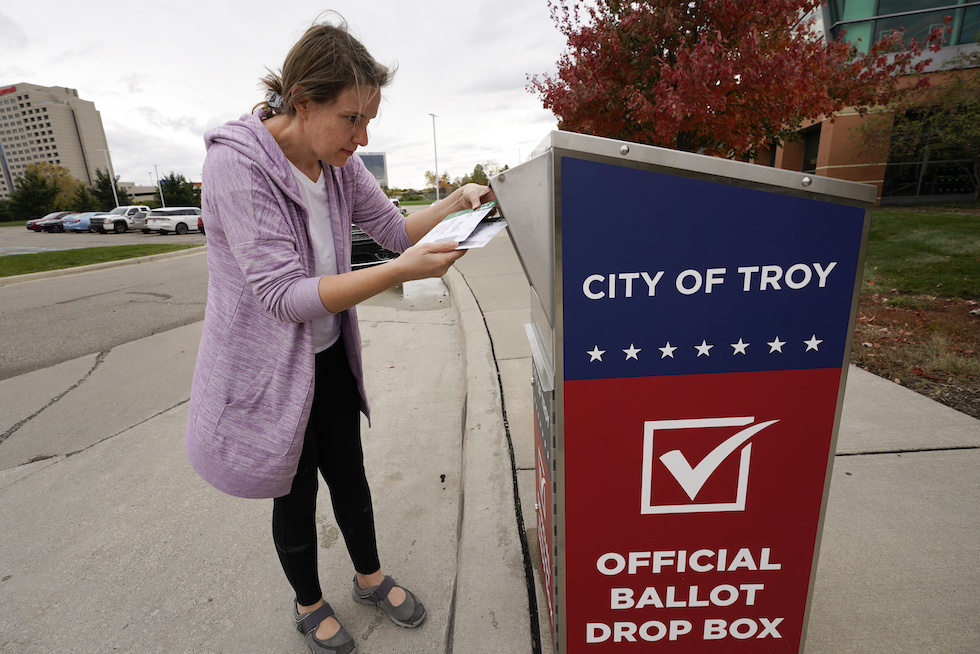On The Money — US, EU put Russia in economic chokehold
It’s Monday and welcome to On The Money, your nightly guide to everything affecting your bills, bank account and bottom line. Subscribe here: digital-staging.thehill.com/newsletter-signup.
Today’s Big Deal: Western sanctions are crushing the Russian economy, and they’re already prompting multinational corporations to flee the country. We’ll also look at how the conflict could impact Americans’ finances and Biden’s plan to fight inflation.
But first, President Biden doesn’t want you to worry about nuclear war.
For The Hill, we’re Sylvan Lane, Aris Folley and Karl Evers-Hillstrom. Reach us at slane@digital-staging.thehill.com, afolley@digital-staging.thehill.com and kevers@digital-staging.thehill.com.
Let’s get to it.
Sanctions strangling Russian economy

Financial sanctions imposed by the U.S. and Western allies are strangling the Russian economy.
As Russian President Vladimir Putin wages war against Ukraine, his country’s economy has begun to collapse under the weight of unprecedented penalties from the Biden administration, United Kingdom, European Union and other major economic players.
- The value of the ruble plunged Monday after the U.S and its allies took action to cut the Russian government off from roughly $600 billion in reserves held by the Central Bank of Russia and further cut Russia’s ties to the global financial system.
- The Western bloc banned most transactions with the Russian central bank — along with Russia’s finance ministry and foreign investment fund — blocking Putin from funds he stowed away for years to cushion the blow of sanctions.
- The sanctions also cut off Russian access to the U.S. dollar, the linchpin of the global financial system, as its value climbs amid global tumult.
“Everyone in the economic sphere, the banking sphere, knows we’re in new territory here—a coordinated shutdown of a country’s economy with the strongest arrow being in the heart of the banking sector,” said George Lopez, expert on economic sanctions at University of Notre Dame’s Keough School of Global Affairs.
In a nutshell: Roughly $300 billion of Russia’s reserves are now locked away from Putin in the U.S., Europe and other allied countries. While Russia still holds billions of dollars worth of gold within its borders, experts say Moscow will find few willing buyers with its banks under their own crushing sanctions.
Without access to its reserves, the Russian government has resorted to desperate measures to keep its economy and financial sector afloat.
The Hill’s Alex Gangitano and Sylvan have more here.
MOSC-OUT
Multinationals flee Russia, punishing Moscow
Large multinational companies are fleeing Russia, joining a large swath of the international community in moving to isolate the nation in response to its brutal invasion of Ukraine.
Oil and gas giants BP and Shell announced they are leaving Russia after spending decades making investments worth billions of dollars in the country, while several U.S. companies are halting all shipments to Russia.
The exodus is expected to continue as more businesses weigh the reputational and financial risks of doing business with Russian President Vladimir Putin. Experts say that if energy firms are willing to forfeit huge sums by pulling out of Russia, industries with much less to lose will soon follow suit.
- Firms are leaving because of enormous public pressure to disown the Russian government and sweeping sanctions imposed by the U.S. and its allies that severely complicate companies’ ability to do business with Russian entities.
- Shell said it abandoned Russian projects valued at $3 billion, while BP said it could lose as much as $25 billion by cutting ties with Russia.
- Meanwhile, FedEx and UPS have canceled shipments to Russia and ocean carriers might join them, further isolating the nation from international trade.
Companies that haven’t fled are likely evaluating how to navigate complex sanctions and exploring whether continuing business with Russia is worth the regulatory challenges. The collapse of the Russian ruble could make that decision easier.
Karl has more on the developments here.
INFLATION FOCUS
Biden to focus on lowering costs in SOTU amid rising inflation
The White House says President Biden will discuss inflation during Tuesday’s State of the Union address while outlining efforts to lower costs for America families.
Biden will announce a new four-piece plan to tackle rising prices, which have taken a toll on his approval ratings. Democrats are worried about losing their congressional majorities in this fall’s midterm elections as consumer frustration bites back at the White House.
- Officials said that Biden’s plan includes making more goods in America and strengthening supply chains, reducing the cost of everyday expenses and reducing the deficit, promoting fair competition to lower prices, helping small businesses and protecting consumers, and eliminating barriers to well-paying jobs.
- Biden will ask Congress to send him legislation that reduces the cost of working families with major elements of Build Back Better, including tackling prescription drug costs, health care premiums, child care and pre-K costs, and energy costs.
- Biden is expected to describe what he calls the manufacturing comeback, tout companies that are opening new U.S. factories and call on Congress to send him bipartisan competitiveness legislation.
Alex has more on the plan here.
INTERNATIONAL WAVES
Five ways the Russian invasion of Ukraine could impact the US economy
The Russian invasion of Ukraine and the unprecedented sanctions imposed in response by the U.S. and western allies have rattled the global economy and financial markets.
They’ve also upended supply chains for crucial food, energy and industrial products amid a global burst of inflation, derailed global travel and driven volatility into the stock market.
Here are five ways the Russian invasion of Ukraine impacts Americans:
- Energy and oil prices rise: Oil prices skyrocketed Monday as Russia’s invasion of Ukraine entered its fifth day and the U.S. and European Union continued to ratchet up sanctions, with Brent crude topping $100 a barrel.
- Supply chain issues for farmers could drive higher food prices: Farmers in the U.S. are bracing for a hike in the price of fertilizer, which was already at a record-high before the conflict. Russia — which is a low-cost, high-volume global producer of fertilizers — is the world’s second-largest producer after Canada of potash, a key nutrient used on major commodity crops and produce, according to Bloomberg.
- Travel restrictions and rising airfare costs:Ukraine has closed its airspace and an increasing number of airlines canceled flights in an out of Russia. A number of countries, as well as the EU, have closed their airspace to Russian carriers.
- Stock market volatility: Stocks have fallen steadily throughout the year as Russia amassed troops on its border with Ukraine and markets braced for a major conflict. The arrival of war and the unprecedented sanctions imposed on Russia could continue to cause wild swings as the financial sector heads into uncharted territory.
- Faster Fed rate hikes: Higher energy and food prices and deeper supply chain bottlenecks could put pressure on inflation and force the Fed to accelerate its pending series of rate hikes.
SIGN UP NOW
Stay ahead of the news cycle with The Hill’s new Evening Report, featuring the day’s top stories and a look ahead to tomorrow.
VIRTUAL EVENT ANNOUNCEMENT
Breaking New Ground: Innovations in Alzheimer’s Research –Wednesday, March 2; 1:00 PM ET/10:00 AM PT
Alzheimer’s disease is currently the sixth leading cause of death in the United States. While recent data indicate nearly six million Americans currently live with the disease, some estimates suggest that number could triple by 2060, causing yearly treatment costs in the hundreds of billions of dollars. What innovations show the most promise for early detection and treatment for this disease that takes a crushing toll on patients, their loved ones and caregivers? Former NIH director Elias Zerhouni, Alzheimer’s Association’s Maria Carrillo and more join The Hill’s Steve Clemons. RSVP today.
Good to Know

A majority of women in key swing states are happy with their personal finances despite broad concerns about the national economy, a new poll found, underscoring the opportunities Democrats may still have to sell their agenda in the months before the midterms.
Here’s what else we have our eye on:
- Governors in states across the country have ordered agencies and asked businesses to cut ties with Russia in largely symbolic stands with Ukraine and against Vladimir Putin’s war of aggression.
- The United Nations’s climate science panel issued a report detailing both the impacts of climate change and potential adaptation measures society can take to mitigate the damage.
- SpaceX CEO Elon Musk says the company’s Starlink satellite internet service has been activated in Ukraine amid the Russian invasion into the country.
- U.S. retailer Target announced it will adopt a minimum wage system that will pay company employees up to $24 an hour.
That’s it for today. Thanks for reading and check out The Hill’s Finance page for the latest news and coverage. We’ll see you Tuesday.
Copyright 2024 Nexstar Media Inc. All rights reserved. This material may not be published, broadcast, rewritten, or redistributed..











